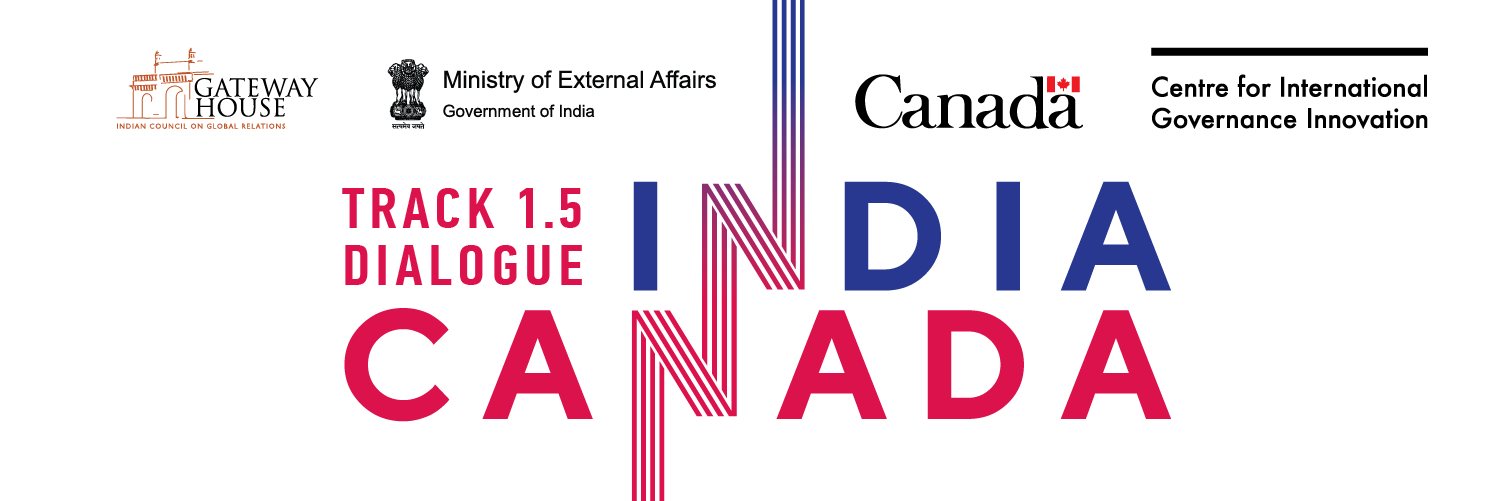
Mumbai, November 22, 2019: The India-Canada bilateral relationship has been growing economically but has yet to reach potential. With a world in transition, now is the time to explore new areas of mutual benefit to the two countries. To that end, Gateway House: Indian Council on Global Relations and the Centre for International Governance Innovation (CIGI) hosted the second India-Canada Track 1.5 Dialogue with a focus on innovation, growth and prosperity. This three-year initiative is supported by the Ministry of External Affairs, Government of India and Global Affairs Canada, Government of Canada.
The Track 1.5 format is a unique gathering of scholars, public policy experts, foreign policy analysts, business leaders and government officials, led by think tanks and supported by governments. Manjeet Kripalani, Executive Director, Gateway House said, “The high-level meeting of the Track 1.5 format is an effective one. Think tanks initiate the bilateral discussion and agenda, providing an opportunity for relevant stakeholders to confer openly on crucial and futuristic subjects of interest to both countries, without restrictions.” Such a partnership enables bold policy recommendations that focus on the future, promoting innovation and tackling shared issues of global governance – issues that are crucial to both countries.
The India-Canada Track 1.5 Dialogue was officially launched in February 2018 during the visit of Canadian Prime Minister Trudeau to Mumbai. The first meeting was held in Ottawa in October 2018, with a research focus and discussions on cooperation on cybersecurity and climate change.
“When we designed this initiative, our thought was that the India-Canada relationship had not been fully utilized to both countries’ benefit. One reason was that the formal and informal mechanisms and tables that you need for this kind of thing to blossom didn’t exist. The India-Canada 1.5 Track Dialogue fills this need and brings to the table research and analytical sectors, policy makers, non-governmental organizations and business sectors to discuss key issues, exchange views and create the soft tissue on which a stronger and deeper relationship can be built. That’s what we’ve been doing for the past year-and-a-half and what we expect to continue this week in Mumbai,” says Rohinton P. Medhora, President, CIGI.
The second edition of this three-year commitment to fostering closer ties between the two countries focused on technology’s impact on global governance, security cooperation, trade in services, and ecological transition. “Canada and India both have a re-elected leadership and can boldly co-design rules on global issues of shared interest – data governance and e-commerce, a reformed trade & multilateral order,” says Kripalani on the bilateral.
The discussion brought together prominent representatives from both countries, most notably; Gourangalal Das, Joint Secretary, Ministry of External Affairs, Government of India; David Hartman, Director General, South Asia, Global Affairs Canada; Sujoy Bose, CEO, National Investment and Infrastructure Fund; Dinesh Kumar Khara, Managing Director – Global Banking and Subsidiaries, State Bank of India; Mark Cohon, Director, Board, Invest in Canada & Executive Chairman, Toronto Global; Pawan Sharma, President & Global Head of Strategic Initiatives, Tech Mahindra; Brijesh Singh, Inspector General of Police, Cyber, Government of Maharashtra and Blaise Fernandes, President and CEO, India Music Industry. Inputs from the discussions, will be submitted to the governments of the two countries.
Endorsing the India-Canada Track 1.5 Dialogue, Dr. Subrahmanyam Jaishankar, External Affairs Minister, Government of India said, “I compliment Gateway House and the Centre for International Governance Innovation (CIGI) for their efforts in steering the Track 1.5 Dialogue initiative, which Prime Minister Modi and Prime Minister Trudeau had agreed in February 2018.
This initiative was meant to facilitate free and frank discussions between both sides, aimed at generating new ideas and pathways for our partnership. Our policy-makers and thought leaders coming together can enrich each other and enrich our cooperation across a range of areas.”
About Gateway House: Indian Council on Global Relations:
Gateway House: Indian Council on Global Relations is a foreign policy think tank in Mumbai, India, established to engage India’s leading corporations and individuals in debate and scholarship on India’s foreign policy and the nation’s role in global affairs. Gateway House is independent, non-partisan and membership-based. Our key areas of study are geopolitics, geoeconomics, energy & environment, space and ocean studies, national security and Bombay history.
About Centre for International Governance Innovation:
CIGI is an independent, non-partisan think tank with an objective and uniquely global perspective. Our research, opinions and public voice make a difference in today’s world by bringing clarity and innovative thinking to global policy making.


